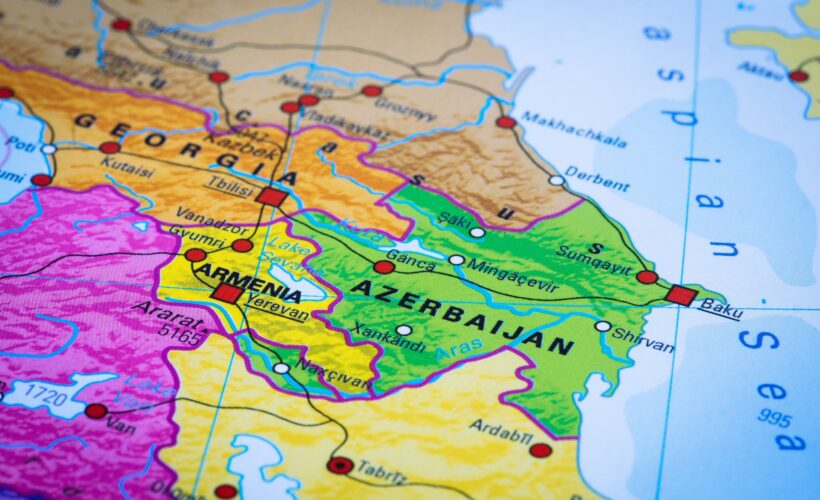On Tuesday 30 April 2024, the Centre for Geopolitics hosted a well-attended event on the theme ‘Sea change in the Baltic? Protecting trade, energy security and supply after Russia’s invasion of Ukraine’. We were pleased to host a distinguished panel featuring Commodore Andy James, Deputy Director within the Defence Nuclear Organisation in London; Dr Katja Yafimava, Senior Research Fellow in the Gas Research Programme of the Oxford Institute for Energy Studies; Dr Izabela Surwillo, Senior Researcher at the Danish Institute for International Studies; and Captain Brian Trim, Secretary to the Chiefs of Staff in the Ministry of Defence. The panel was chaired by Trevelyan Wing, Baltic Fellow of the Centre’s Baltic Geopolitics Programme.
The panel examined how energy security in the greater Baltic Sea region has evolved since Russia’s 2022 invasion of Ukraine, and how energy and other vital trading and supply networks can be safeguarded in a new age of geopolitical competition and grey-zone conflict. In turn, the speakers discussed how energy security in the Baltic has been challenged since 2022, and explored how countries across the region have had to adapt their energy consumption and supply habits in light of the shifting strategic landscape. Likewise, the panel also investigated the historic and current role of navies in protecting Baltic trade and general commercial activity. The event was organised in partnership with the Royal Navy and the Council on Geostrategy, and was one of three official side events as part of the First Sea Lord’s Sea Power Conference 2024.
Commodore Andy James kicked off the exchange by emphasising the importance of fostering a dialogue between public and private sectors, military officials, parliamentarians, industry, academia, and the media. He asserted that defence thinking has shifted since Russia’s invasion of Ukraine, and recalled a range of discussions on the credibility and utility of NATO. First, Commodore James analysed the renewed focus on the ‘homeland’ – namely, the vulnerability of energy supplies and public perceptions of this. Secondly, he stressed that defence is a ‘team sport’ and that states need support from their neighbours. Commodore James then touched upon the concept of resilience and the difficulty of being both resilient and truly efficient, before finally addressing the role of technology innovation and in particular the vulnerabilities of critical infrastructure in an underwater environment.
Next, Dr Katja Yafimava examined international political aspirations to limit dependence on Russia gas by 2027, the absence of a complete ban on Russian energy imports, and the use of liquified natural gas (LNG) by European countries. She also discussed the physical security of infrastructure and cases whereby such infrastructure is not operational for legal reasons, looking specifically at four main corridors: Nord Stream and the Polish, Ukrainian, and Turkish pipelines. Additionally, Dr Yafimava analysed European attempts to advance decarbonisation and electrification, the continent’s long-term, permanent decline in domestic demand and gas production, its recent termination in the Netherlands, as well as the security of underwater pipelines in Norway. She concluded her remarks by emphasising questions of Europe’s future with regard to demand and the return of some Russian gas, along with the financial challenges associated with energy security imperatives.
Dr Izabela Surwillo then provided an in-depth regional overview of energy security across the Baltic in a geopolitical and historical context. She analysed the securitisation of energy policy and the protection of infrastructure in domestic and regional dimensions, and discussed converging perspectives on energy security and the various aims and objectives pursued by Baltic countries. In addition, she commented on security issues of physical infrastructure in times of war, as well as challenges related to cybersecurity and localised cyberattacks. Dr Surwillo stressed that energy security in the Baltic Sea region is a multilevel challenge, and that it is especially important to have backups in place in the event of energy supply disruptions such as power outages, alongside a high repair capacity. She concluded by stressing the significance of regional collaboration, the monitoring of both underwater and surface-level maritime environments, the development of new technologies such as AI and information fusion, information sharing, and societal and political resilience.
These individual contributions were followed by a general discussion with the panel and Captain Brian Trim, moderated by the chair, Baltic Fellow Trevelyan Wing. The audience Q&A that followed saw a range of interesting questions raised, including how to secure the basic critical infrastructure that is transporting energy and other vital supplies; how societal and political resilience can be nurtured; the investigations into the North Stream explosions, and their implications in light of the recent accession of Finland and Sweden to NATO and the potential use by Russia of the TurkStream pipeline in the Black Sea as well as infrastructure in the Mediterranean to destabilise European networks; ‘re-packaged’ Russian gas imports in the Baltic states; the quality of current infrastructure in light of non-military risks; as well as what capabilities Britain could reasonably deploy to the Baltic Sea region, and why it would choose to do so.
It was a fruitful and thought-provoking discussion throughout, and we thank our esteemed panellists and engaged audience members for their insightful contributions on this timely and important topic.







